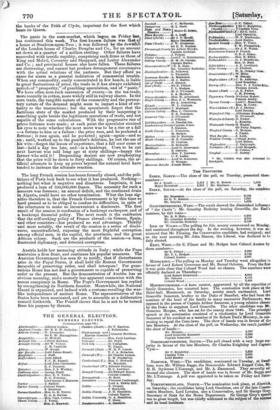The panic in the corn-market, which began on Friday last,
has continued this week. The first knawa failure was that of a house at Stockton-upon-Tees ; it was followed by the downfall of the London house of Charles Douglas and Co., for an amount set down at a quarter of a million sterling. Other failures have succeeded with terrific rapidity, comprising such firms as those of King and Melvil, Coventry and Sheppard, and Lesley Alexander and Co. ; and provincial houses also have fallen. These failures are distressing, and cannot but produce derangement coextensive with the actual relations of the partners. But they afford no • cause for alarm as a general indication of commercial trouble. When any commodity, easily concentrated in few hands, is liable
• to great fluctuations of price, the trade in it has always exhibited . penods of" prosperity,' of gambling speculation, and of "panic." We have often seen such succession of events—in the tea-trade, more recently in cotton, more widely still in railway shares. In the corn trade, the tangible nature of the commodity and the peremp- tory nature of the demand might seem to impart a kind of cer- tainty to the transactions ; but the speculators forget that the factitious state of the market produced by their tampering is , something quite beside the legitimate operations of trade, and not capable of the same calculations. With the progressive rise of prices fortunes were made ; at each point the speculator strained his eyes to note whether the next move was to be a rise or a fall • —a fortune to him or a failure : the price rose, and he pocketed a fortune ; it rose again, and he pocketed ; again—again—and so on; • until, worked up to the gambler's delirium, he lost the use of his wits—forgot the lesson of experience, that a fall must come at last—held a day too late, and—is a bankrupt. Corn to be cut next harvest was sold long ago at sixty shillings—happy the farmer who sold it ! Desponding dealers are now prophesying that the price will be down to forty shillings. Of course, the ar- tificial attempts to keep up prices beyond the natural level have tended to increase the ultimate reaction.


























 Previous page
Previous page